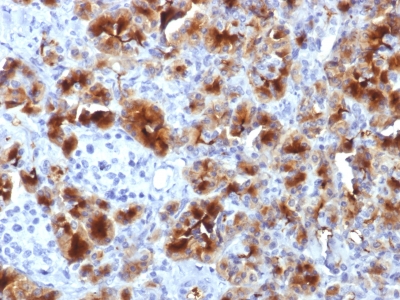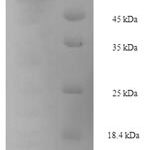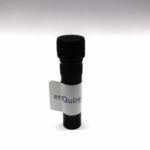Human Anti-GP2 Antibody Product Attributes
GP2 Previously Observed Antibody Staining Patterns
Observed Antibody Staining Data By Tissue Type:
Variations in GP2 antibody staining intensity in immunohistochemistry on tissue sections are present across different anatomical locations. An intense signal was observed in exocrine glandular cells in the pancreas. More moderate antibody staining intensity was present in exocrine glandular cells in the pancreas. Low, but measureable presence of GP2 could be seen in. We were unable to detect GP2 in other tissues. Disease states, inflammation, and other physiological changes can have a substantial impact on antibody staining patterns. These measurements were all taken in tissues deemed normal or from patients without known disease.
Observed Antibody Staining Data By Tissue Disease Status:
Tissues from cancer patients, for instance, have their own distinct pattern of GP2 expression as measured by anti-GP2 antibody immunohistochemical staining. The average level of expression by tumor is summarized in the table below. The variability row represents patient to patient variability in IHC staining.
| Sample Type | breast cancer | carcinoid | cervical cancer | colorectal cancer | endometrial cancer | glioma | head and neck cancer | liver cancer | lung cancer | lymphoma | melanoma | ovarian cancer | pancreatic cancer | prostate cancer | renal cancer | skin cancer | stomach cancer | testicular cancer | thyroid cancer | urothelial cancer |
|---|---|---|---|---|---|---|---|---|---|---|---|---|---|---|---|---|---|---|---|---|
| Signal Intensity | – | – | – | + | – | – | – | – | – | – | – | – | – | – | – | – | – | – | – | – |
| GP2 Variability | ++ | + | + | ++ | + | + | + | + | + | + | + | + | + | + | + | + | ++ | + | + | + |
| GP2 General Information | |
|---|---|
| Alternate Names | |
| Pancreatic secretory granule membrane major glycoprotein GP2, GP2 | |
| Molecular Weight | |
| 59kDa | |
| Chromosomal Location | |
| 16p12 | |
| Curated Database and Bioinformatic Data | |
| Gene Symbol | GP2 |
| Entrez Gene ID | 2813 |
| Ensemble Gene ID | ENSG00000169347 |
| RefSeq Protein Accession(s) | NP_001493, XP_016878644, NP_001007243, NP_001007241, NP_001007242 |
| RefSeq mRNA Accession(s) | NM_001007241, NM_001007242, NM_001502, XM_017023155, NM_001007240 |
| RefSeq Genomic Accession(s) | NC_000016, NC_018927 |
| UniProt ID(s) | Q68D34, B7Z1G2, P55259 |
| UniGene ID(s) | Q68D34, B7Z1G2, P55259 |
| HGNC ID(s) | 4441 |
| Cosmic ID(s) | GP2 |
| KEGG Gene ID(s) | hsa:2813 |
| PharmGKB ID(s) | PA28822 |
| General Description of GP2. | |
| GP2 (glycoprotein 2), also known as ZAP75, is a 537 amino acid secreted protein. It is an integral membrane protein that is secreted from intracellular zymogen granules and associates with the plasma membrane via glycosylphosphatidylinositol (GPI) linkage. GP2 is cleaved and then released into the pancreatic duct along with exocrine secretions. GP2 binds pathogens such as enterobacteria, thereby playing an important role in the innate immune response. The C-terminus of this protein is related to the C-terminus of the protein encoded by the neighboring gene, uromodulin (UMOD). GP2 is also expressed on the apical plasma membrane of specialized microfold (M) cells among enterocytes and serves as a transcytotic receptor for mucosal antigens. M cells are considered a promising target for oral vaccination against various infectious diseases. | |






There are no reviews yet.